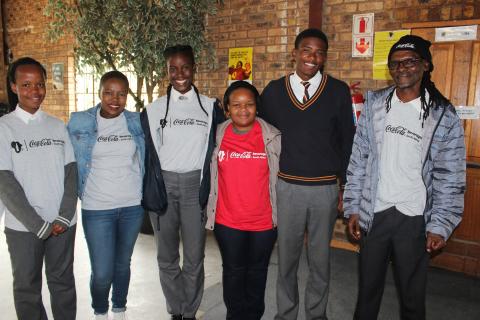
Don’t you hate it when big corporate organizations neglect their duty and promise to give back to communities they operate in? Well Coca Cola Beverages South Africa has been showing the community of Ebony Park, Rabie Ridge and Ivory Park that they give back to communities through various interventions.

On the 22nd of February, Coca-Cola Beverages South Africa together with the IkamvaYouth Ebony Park branch launched a Soul Ambassadors network for CCBSA employees and participated in the Ebony Park Mentorship day. The Soul Ambassadors are a network of CCBSA employees coming together for a good cause. Soul Ambassadors are CCBSA employees who are passionate about the community and give of their own time to deliver positive change in the communities where we operate. CCBSA supports these individuals by providing them with extra time outside of the one day community leave given to all employees to execute this work as well as funding to deliver the plan.
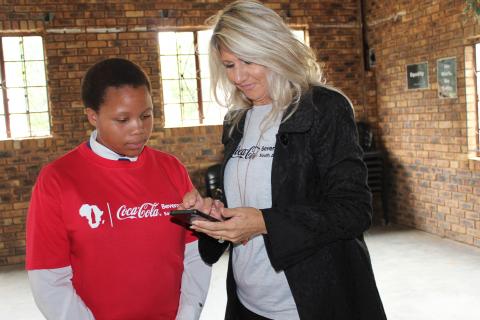
The idea is to offer CCBSA employees a chance to change someone’s life through mentorship; by helping learners / scholars move from their current state to their desired state. Learners from different schools around Midrand and Tembisa who are part of the IkamvaYouth family came in numbers to celebrate the day and also be part of the mentorship program together with CCBSA Soul Ambassadors. During the launch, the Ebony Park branch Grade 11 learners were all paired up with mentors from the CCBSA Soul Ambassadors and signed the IkamvaYouth Mentor-Mentee agreement.
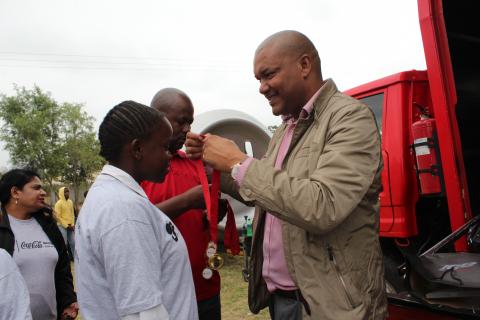
The IkamvaYouth mentorship program enables learners to access post-school opportunities. Although the career guidance workshops increase learners’ awareness of post-school opportunities and ways to access them, IkamvaYouth learners also need one-on-one support from a mentor to help them make the transition from secondary to tertiary education. The mentoring programme ensures that every Ikamvanite accesses tertiary education and/or employment once they matriculate. Secondary objectives of the programme include developing communication skills, self-knowledge and self-esteem.
Ikamvanites who participate in the mentoring program get the following benefits:
-
Increase in the mentee’s self-confidence
-
Helps the mentee learn to take better control of his or her career
-
Teaches the mentee how to speak up and be heard
-
Educates the mentee on how to accept feedback in important areas, such as communications, technical abilities, change management, and leadership skills
-
Improves the mentees interpersonal relationship skills
-
Provides an important networking contact for the mentee
This mentor-mentee relationship also enables the CCBSA Soul Ambassadors to:
-
“Give back” — to the organisation, the community and the mentee
-
Reminds the mentor how to listen actively rather than passively
-
Encourages the mentor to share knowledge and help shape the future of our youth
-
Strengthens the mentor’s interpersonal relationship skills and perceptions of the various problems facing our country’s youth and education system
-
Teaches the mentor about other areas/departments within the organisation
-
Helps re-energize the mentor’s career
Ikamvanites had this to say;
“We all need that one person who can share knowledge with you and guide through your difficult time and also be there as a thinking partner”- Adele Kayitare
“It’s a good opportunity for me to know more about Coca-Cola as it is one of the biggest organisations in South Africa. Having someone from Coca-Cola to mentor me is a blessing and I’m looking forward to the relationship” Tsolofelo Moeletsi
As Ikamvanites take a journey to success, CCBSA Soul Ambassadors will be right there with them to ensure that they reach their desired outcome.
Their Future is in their hands.
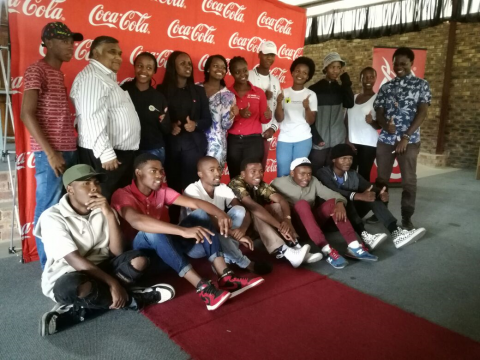

Coca-Cola Beverages South Africa (CCBSA) has invested generously in the futures of youth in Gauteng (in Ebony Park and Mamelodi), North West (in Ikageng and Mahikeng), and Kwa-Zulu Natal (in Umlazi). Through enabling the non-profit organisation IkamvaYouth to establish and grow branches in these communities, CCBSA has ensured that learners are receiving supplementary academic tutoring, career guidance, mentoring and computer literacy training so that they can achieve academic excellence and go on to access tertiary education, employment and entrepreneurial opportunities.
IkamvaYouth and CCBSA are proud to announce that the class of 2016 has achieved an 86% pass rate, with 70% achieving bachelor or diploma passes, ensuring eligibility for tertiary study.
“As CCBSA we have always believed in the youth of SA. This country has amazing potential to do great things, what we need is for all South Africans to believe this truth. We are delighted to be in a fortunate position to contribute to the greatness of South African young people through our partnership with Ikamva Youth and our other flagship projects in Youth Enterprise Development and Environmental Management. To the class of 2016, well done. You are the reason why we will keep investing in young South Africans.” says Tshidi Ramogase, Public Affairs & Communications Director at CCBSA.
Motlapso Maredi, top learner at Ebony Park, says that “Hard work is the most important thing, as even with support from all angles if you aren’t motivated it doesn’t make a difference. I have received offers from all the universities that I have applied to. I would love to thank IkamvaYouth, the mentors and the sponsors. Every learner has a way of learning. Believe in yourself and your potential”. Motlapso has been accepted at UCT for BCom Law.
The investment in these learners will have positive ripple effects far into the future. Thabisile Mfeka, from the Umlazi branch, achieved a Bachelor pass and plans to pass on her love of education and learning, as she will be studying a B(Ed), towards teaching Maths, Science and English to learners in grades seven to nine.
“We are so proud of our learners and tutors, as well as the team behind them, and thank CCBSA for the ongoing support that is needed to produce results like these, year after year,” says Leigh Meinert, chairperson at IkamvaYouth.
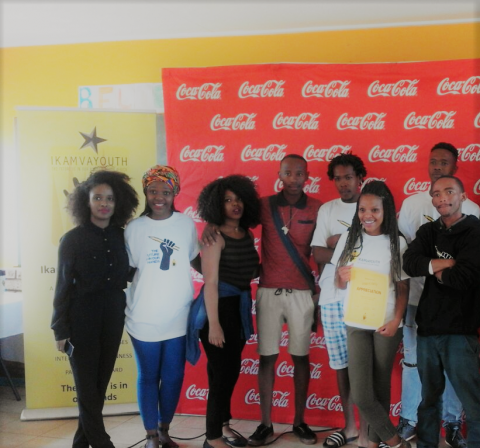
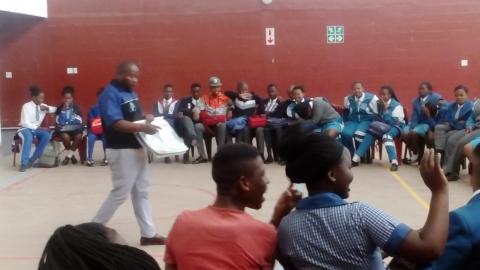
Peers in Sexual Health (PSH) visited IY Makhaza branch on Thursday afternoon, 03 November, to present about the sexual health issues that are facing the youth today. The presentation and engagement was attended by 44 Grade 10 learners.
The topic for the day was STI prevention. The learners engaged on this topic by outling the risks associatied with STIs; the ways of prevention, treatment, symptoms and the stages of sexually transmitted infections (STIs).
Jabulile, PSH representative, showed the learners illustrations of STIs developing in the body and explained the process. Siphokazi Ntlati, Makhaza intern, assisted Jabulile by jotting down questions the learners were asking during the presentation. One learner, Aluncedo Mzamo, asked whether STIs are listed as a chronical disease and if they lead to death. Jabulile explained that STIs are not chronical and can be cured, however they may lead to death if not treated. Treament for males and females are not the same as STIs are different. Tebogo Mayaphi, grade 10 learner, thanked Jabulile and expressed how helpful the information shared is as he has provided clarity on the questions he had regarding the differences in treatment for males and females.
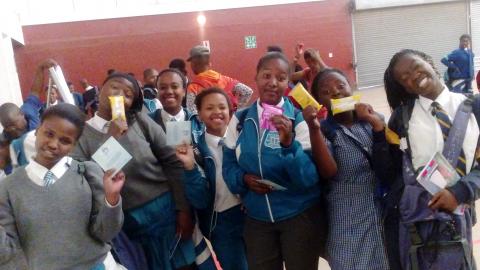
To end the session Jabulile gave learners male and female condoms and pamphlets to read more on sexual related diseases.
A huge thank you to peers in sexual health for partnering with IkamvaYouth.
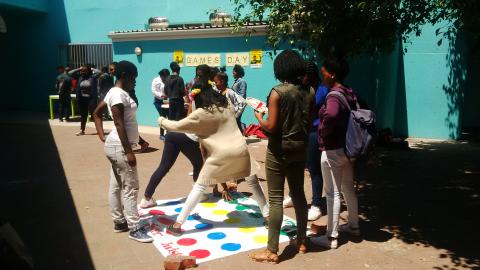
On Saturday 29th October, IkamvaYouth Nyanga hosted a Games Day for all the learners. As exams drew nearer, we decided it would be a great idea to relieve the exam stress through an afternoon filled with fun and laughter. Recognizing that it is a critical time of the year, the learners first completed the academic tutoring session as per normal. After 12:00pm it was pens down and hello to the board games!

Thank you to our friends at PricewaterhouseCoopers (PwC) for donating fun board games for the day. There were nine game stations set up; with each game station offering a different board game. Learners played in small teams and rotated game stations after a set time. The board games available included Monopoly, Chess, Dominoes, Uno, Jenga and many more. The tensions at the Jenga and Chess stations were high, while the pressure kept on building at the 30 Seconds station. Learners, volunteers and staff alike were engrossed in the different board games.

[A learner and tutor battle it out in a game of Chess]
After the fun-filled and competitive afternoon, lunch was served with a few treats for the road. The afternoon was closed off with a fun yet tricky competition which involved maneuvering an Oreo biscuit from your forehead to your mouth without touching it with your hands. This was the perfect ending to a lovely day. It felt good to have an afternoon of pure fun and games at the branch.

We are especially grateful to our superhero tutor Nosipho Mjiyakho and our friends at PwC for making this event possible.

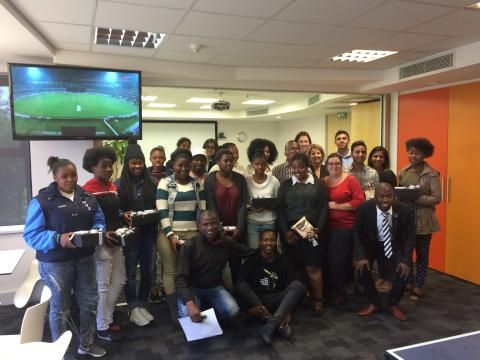
The vibrant State Street mentors have shown that an essential first step in a successful mentoring program is for both the mentor and mentee to identify, define, and honestly articulate their common and individual goals and motivations. On the afternoon of the 28th of September 2016, the Masiphumelele matriculants attended their closing session with their mentors. The learners were ready and very excited to catch up with their mentors especially since we’re getting closer to the deadline for tertiary applications and exams!

Thato Kola (State Street Mentoring organiser) and Nathan (State Street vice Director) gave some motivational words to learners, before they paired up with their mentors for their final session. We would like to express our deepest gratitude to all the State Street mentors and their team for knowledge and wisdom they have imparted upon IY learners. It has been a great help and support throughout the year. I believe success for our matriculants is at least in part due to the sincere support and mentorship provided by State Street.
Alex and I have been attending the Education NGO Leadership Summit in Benoni today, hosted by the National Education Collaboration Trust (NECT).
Godwin Khosa (NECT’s CEO) explained the reasons behind NECT’s focus on interventions at the district level; he said that ultimately, we need to focus on interventions that hold potential for changing the system as a whole. Hence, they are not focusing on the level of the learner, or at that of the school. He said that while NECT could hold Saturday classes and see increased improvement in Maths and Science, these initiatives take a lot of effort, are not systemic, and have a lower sustainability potential.
And I agree with him, in that it’s clear that the system needs an overhaul, with the functionality of schools, districts and provinces increasing dramatically. However, I’m really concerned about the idea that working at the “learner level” is seen as too much effort, unsustainable, and not systemic.
We all know that the learners currently enrolled in the system are in dire need of remedial support to overcome the deficits in their grasp of the basic fundamentals, especially with regard to literacy and numeracy. 27% of our grade 6 learners are functionally illiterate (SACMEQ, 2007), grade 9s scored an average 14% in Maths in the ANAs (2014), and only 3% scored more than 50%. In 2015, the matric pass rate was 71%, but due to heavy grade dropouts, the cohort pass rate was actually just 41%.
Khosa outlined the achievements of NECT to date. While there were some references to “evidence of improvement in the organisation of schools,” the achievements were primarily limited to a list of outputs (number of principals and HODs trained, number of resource packs availed, flash cards, management trackers, etc.) rather than outcomes. Now, while Khosa is absolutely correct that expecting to see improved learner outcomes from NECT in this early stage of its operations (just two years), I am unconvinced that this approach is sufficient for ensuring that 90% of learners pass Maths, Science and Language at above 50% level by 2030 (NECT’s very important and compelling overall objective).
As I outlined in the interview with Business Day a few weeks ago, learners’ gaps in understanding and comprehension, particularly when it comes to STEM and language subjects, require individual attention and personalized learning experiences. And while ICT provides some opportunity for offering personalised and responsive learning experiences at scale, all ed-tech people will tell you, the tech is only ever going to be a small part of what it takes to improve learner achievement.
Learners need relationships, with people who give them time, who build their trust, who help them to figure out where their gaps and challenges are, and then provide them with the academic and psycho-social support they need to dramatically improve their results and confidence. In some homes (mostly in middle class homes), parents and caregivers have the education and time to do this. Most middle class families also enroll children in after-school tutoring programmes.
Unfortunately, this additional support is unavailable to the majority of our country’s learners. It is unrealistic to expect that the education system can provide this level of individualized support to learners, especially when we consider the psycho-social challenges that learners in the lowest quintiles are up against. But the view that doing so is too difficult will ensure the perpetuation of our learners’ dismal academic performance. How can we produce outcomes at the learner level, without working with learners?
Lynn van der Elst, from Miet, said that we need to better understand Government, to put ourselves in their shoes and try understand why things work the way they do. And I think that this important point speaks to the impetus behind NECT’s decision to focus at the district level and above, as levers that make sense for systemic interventions. Government’s job is to serve the 12 million learners who are supposed to be enrolled in the system. Just providing learning materials to 12 million learners must be a colossal challenge, and so it’s unsurprising that the provision of textbooks and digital learning resources is hailed as a systemic intervention, despite the lack of empirical evidence that this will lead to improved academic achievement.
Speakers also spoke about the role of NGOs as innovators, and called for increased collaboration and stronger networks of support. The National Development Plan highlights active citizenry as one of its core pillars, and most of the speakers identified the promotion and creation of active citizenry as a key role for civil society. It is these active citizens that can step up and provide the intense level of support and care that learners need, so that we can see the kinds of radical shifts in academic achievement so desperately needed.
IkamvaYouth’s volunteer tutors and mentors are evidence of what’s possible when citizens become active. Most of these volunteers are university students, and many used to be learners in the programme themselves. By consistently showing up to meet learners where they’re at, they effectively assist learners to dramatically improve their academic results, and go on to access tertiary education, learnerships or jobs. We’re working with almost 20 other tutoring and mentoring programmes, towards achieving collective impact, and together, we will be reaching 3000 learners this year.
Deputy Minister Mr Enver Surty challenged us about the tiny size of our interventions, and encouraged us to think big. “How do we take the principles and vision of the NDP into practical reality?” There were many NGOs in the room who are indeed promoting, inculcating and coordinating active citizens. NGOs like Enke, Fundza, TEACH South Africa, Room to Read, WESSA, Partners for Possibility, Equal Education, Bridge, Section 27 and Breadline Africa. NGOs who are inspiring, recruiting, equipping and coordinating active citizens to roll up their sleeves and get involved in educating learners, providing a pipeline of educators, supporting principals, improving schools, challenging policymakers, and ultimately working towards the NDP’s big goals. While many are working together already, there is always room to better leverage the potential of collaboration. And it is only through collaboration that we’ll be able to operate at the scale that makes sense to Government.
The meeting began with a screening of Thandi’s story, which so smartly illustrates the challenges that the NDP aims to address and overcome. When Trevor Manual spoke at IkamvaYouth’s ten year birthday bash, we screened Funeka’s story, to illustrate the impact that after-school tutoring and career guidance mentoring can have. A meaningful way to contribute towards the NDP’s implementation for civil society is to mobilise and activate citizens, and to coordinate our efforts, with each other, and with Government, so that together we can reach more learners like Thandi and enable them to leverage education and improve their lives, just like Funeka.
We appreciate NECT’s efforts to bring us together, and are looking forward to future engagements. Thank you for this opportunity, which we hope is just the beginning of a more cohesive and collaborative approach to realising the NDP.












 Lloyd Lungu
Lloyd Lungu